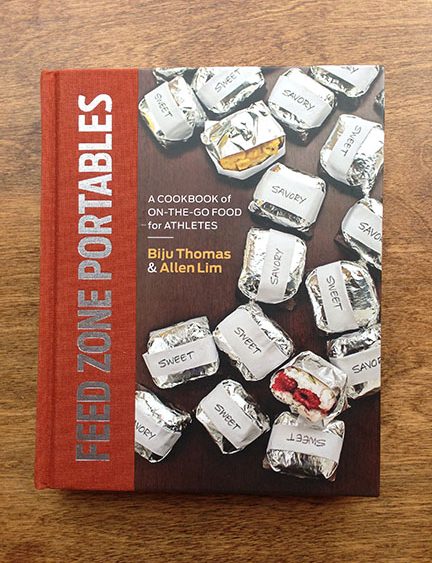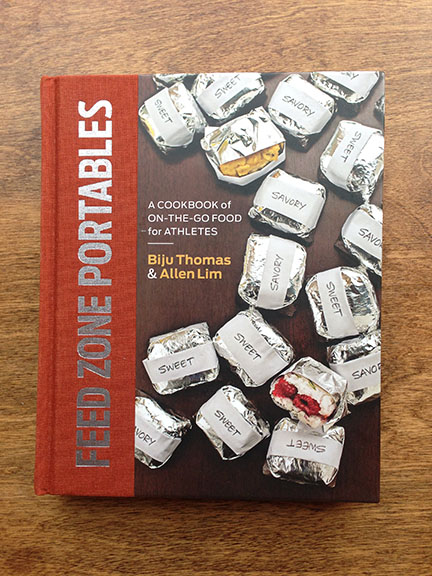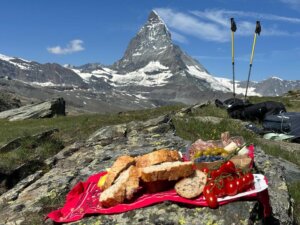By Allen Lim and Biju Thomas
As a hiker and a cyclist, I’m always looking for good food that I can eat on the go, so I was pretty excited when I stumbled upon Feed Zone Portables by Allen Lim and Biju Thomas. Lim and Thomas developed this book for endurance athletes, but you don’t have to be a sports star to enjoy the recipes in this book. In fact, anyone looking for a delicious portable snack will benefit, especially hikers.
If you’re like me, then you don’t always want to pack a full lunch when you head out on a hike. Call it lazy if you will. Sometimes I just want to grab something quick, throw it in my pack, and go, especially if I’m only going for a short hike. Sometimes I don’t know how long I’m going to hike, so I throw a little food in my pack “just in case.” Fresh fruit works, of course, but it doesn’t always satisfy, especially if I hike longer than expected. Ditto for veggies. I’m easily hungry twenty minutes later. Gorp is an old staple, but I burned out on that long ago. What’s left? I usually default to energy bars, which certainly have their place, but I’m burned out on those too. Plus, energy bars hurt my stomach when I push the pace in other activities like cycling, so I’m ready for something different.
Enter the portable.
I like this book because it’s based on the simple premise that food should be made from simple recipes that make you feel good and perform better.
It should be noted that these recipes do tend to be heavy on carbohydrates because that’s what endurance athletes burn. This is not a recipe book for sedentary couch potatoes or desk jockeys. It’s a book for people who are active, working hard and sweating. Hikers certainly fit the bill. That said, if you are the type of person that grabs a cookie or a candy bar for a mid-afternoon snack, even when you’re not exercising, then this book will give you a somewhat healthier alternative. The recipe for Thomas and Lim’s Apple Two-Bite Pie, for example, uses a lot less sugar than you’ll find in a store-bought equivalent.
The recipes in this book also have A LOT more moisture content than you’ll find in pre-packaged energy bars. It makes perfect sense. Energy bars need a long shelf life, but the tradeoff is that you have to rehydrate them once they’re in your gut. It might not a big deal if you’re wandering at a leisurely pace through the woods, but things can get rather uncomfortable in the lower quadrants when you push the pace in the heat, on a climb, or with your Tuesday night cycling group. From personal experience, the added moisture in these recipes has, for me, been the biggest thumbs up, and this book is filled with recipes for just about every taste.
Allen Lim made a name for himself by supplying delicious, portable rice cakes to cyclists on the pro circuit in Europe. There is a whole section on rice cakes including, Denver Rice Cakes, Swiss Rice Cakes, Blueberry & Chocolate Rice Cakes, and more.
The book also features baked egg portables with recipes for a Potato and Leek Frittata, Rice Soufflé, Spinach & Zucchini Frittata and Crispy Rice Omelet.
If you think that portable eggs sound gross then think again. Eating a baked egg portable is almost no different than stopping for an omelet at an alpine hut during one of our alpine hiking tours. Omelets are a great hiker’s repast, and the Mushroom & Swiss Frittata in this book tastes great on a cold and rainy afternoon.
There’s also a sizeable section on two-bite pies, (both sweet and savory) with recipes for traditional piecrusts, warm dough and quick crusts. Thomas and Lim present some pretty interesting shortcuts for making gluten-free crusts too.
The recipe for gluten-free chocolate cakes is one of my favorites. The cakes have just the right amount of moisture. They taste good, and they’re not overly sweet. In fact, you get just the right amount of chocolate without the sticky sugar mouth that you get from traditional recipes. You can bake the cakes in individual muffin tins, or in an 8” square pan divided into the size of your liking. Throw a batch of bars in the freezer and you’re good to go for a couple of weeks.
A fresh batch of portables in the freezer—ready for the next adventure.
Rice cakes and omelets probably don’t sound very portable, but trust us, they are. These recipes were developed for pro cyclists and endurance athletes so they had to be able to fit into jersey pockets and fuel belts, unwrap easily and resist crumbling. Sound perfect for hiking? They are!
My only complaint with this book actually has nothing to do with the book at all. My frustration has to do with the scarcity of something called “Nonstick Pan-Lining Paper” by Reynolds which Thomas and Lim recommend for wrapping up their portables. I found pan-lining paper once while traveling in the Midwest. It’s basically aluminum foil on one side, and parchment paper on the other. It works brilliantly and much better than the non-stick aluminum foil that is so ubiquitous. I’m hooked on it, but none of my local grocery stores carry it, so I’m back to nonstick foil. If you buy the book, and you run across pan-lining paper, then stock up. Who knows how long it will be around. Regular aluminum foil works, but it tears, and it’s just not as nice.
Thomas and Lim also put together some really nice chapters on nutrition and the science behind these recipes with sections on hydration, calories, gastric emptying, glycogen storage, osmotic pressure and more. It’s probably overkill for the average hiker, but there’s some really good stuff in there. You’ll really love it if you’re a cyclist, a runner, or you compete in any kind of endurance event. I was quite shocked when I read the section on calorie consumption. I’m one of those guys who aimlessly stuffs away calories just because I’m exercising (naively thinking that I’ll burn them off). After reading Feed Zone Portables, I’m convinced that a lot of us eat way more than we need.
In closing, here’s a quote from the book.
“Nourishment is something much greater than calories or individual ingredients. It’s the soul in a great dish, pursuing a goal with close friends and family, and taking care of our entire being.”
And another…
“The practice of making real food is not always easy, especially when our lives are busy and stressful. But when all is said and done, we still need and want healthy, fresh and simple portable foods to keep us fueled and nourished when we’re on the move.”
Amen to that.























Comments are closed.